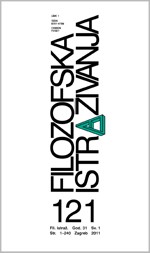Hobbesova philosophia prima
Hobbes’ philosophia prima
Author(s): Zdravko PerićSubject(s): Philosophy
Published by: Hrvatsko Filozofsko Društvo
Keywords: Thomas Hobbes; metaphysics; existence; accidents; power; individuality; hylomorphism; motion; mechanicism; materialism
Summary/Abstract: The purpose of this paper is to show the starting point of Hobbes’ philosophy, which is important because it is present in all aspects of his philosophy – sometimes explicitly and sometimes implicitly. In terms of subject of the first philosophy, Hobbes presented his basic views which significantly differ from Aristotle’s and scholasticism. Inspired by the achievements of modern science, he directed his thoughts towards philosophy of mechanicism and materialism. By abandoning traditional metaphysics, which placed the concept of being in the center of attention, he showed great commitment to logic and epistemology. This mode of philosophizing allows him to perceive reality differently than his predecessors. Hobbes explains reality as moving matter which is best disclosed through study of mechanical laws. He not only demonstrated his philosophical distinctions from the predecessors, but also in relation to contemporaries. Particular attention draws his criticism of Descartes’ dualism which separated mind from the body in two metaphysical substances.
Journal: Filozofska istraživanja
- Issue Year: 31/2011
- Issue No: 01/121
- Page Range: 129-145
- Page Count: 17
- Language: Croatian

